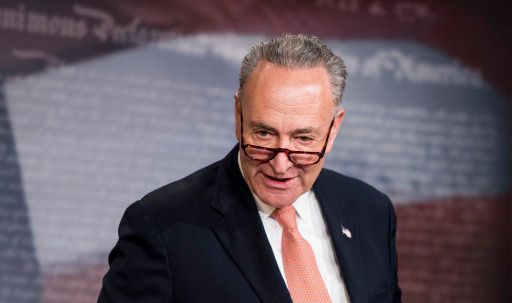Senate Minority Leader Chuck Schumer ©CQ-Roll Call/SIPA USA/PA Images
As Washington reacts to the firing of FBI Director James Comey, suspicion is rife that it is linked to the ongoing bureau investigation into the president’s ties to Russia. As we might expect, leading Democrats like Senator Elizabeth Warren and Senate minority leader Chuck Schumer have called for a special prosecutor on the issue. But even Republicans have joined in the criticism of Donald Trump’s decision. Richard Burr, who is leading the Senate’s investigation into Russian interference into the election, has said he is “troubled” by the timing and reasoning of Comey’s exit. Congressman Justin Amash tweeted that he was “reviewing legislation to establish an independent commission on Russia.”
By now, it should be painfully obvious that the government—both the executive and legislative branches—is both incapable of and fundamentally uninterested in investigating the Trump administration’s ties to Russia. The Comey episode is only the latest chapter in a campaign of disinformation and betrayal of the public trust across both the House of Representatives and the White House, which has already forced Congressman Devin Nunes, chair of the House committee on intelligence, to step aside from its probe on Russia.
So are those calling for a special prosecutor right to do so?
These appointments have a colourful history, and both their mandates and the procedures underlying their appointment are not widely understood, even in the United States. The most famous special prosecutor in modern times may be Archibald Cox, appointed to investigate Watergate by then Attorney General Elliot Richardson. After being subpoenaed to hand over secret tape recordings made in the White House, President Nixon ordered his Attorney General to fire Cox—an order which he refused to carry out, resulting in the infamous “Saturday Night Massacre” in which both Richardson and his deputy were fired.
Mainly as a result of this unseemliness, Congress passed the Ethics in Government Act, under which special prosecutors were chosen by an independent three-judge panel. But although around 20 special prosecutors have been appointed under this law, it was originally enacted only for a period of five years, and has been sporadically re-authorized since. (Attorney General Janet Reno directly appointed the first Whitewater special prosecutor Robert Fiske, but his successor Ken Starr was appointed by the three-judge panel).
Today there is no special prosecutor law on the books, which presumably means that Attorney General Jeff Sessions could appoint one if he feels it is prudent. However, in March Sessions had to pledge to recuse himself from investigations on Russia after it emerged that he had undisclosed conversation with Moscow’s envoy, making it likely that he would refer the appointment to a deputy. This is no guarantee of independence, though special prosecutors in the past have shown a willingness, even an enthusiasm, for following the trail of breadcrumbs wherever they may lead. It is not a perfect instrument—but a special prosecutor may be the best tool for the job in the American system right now.












